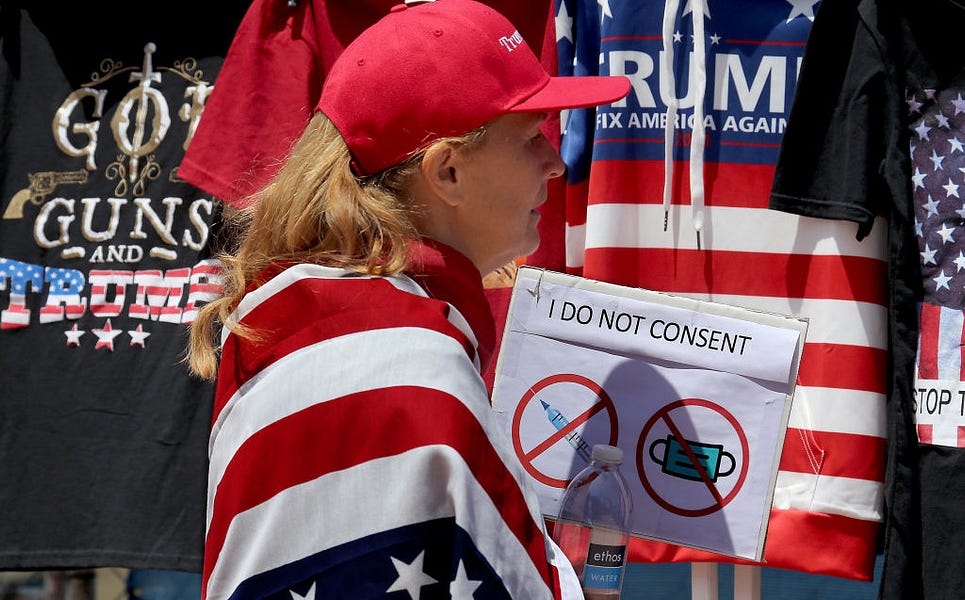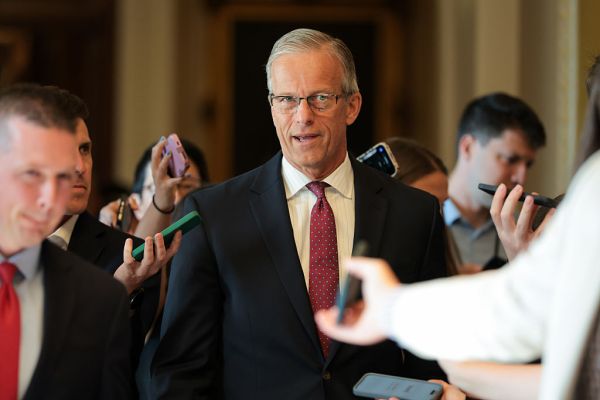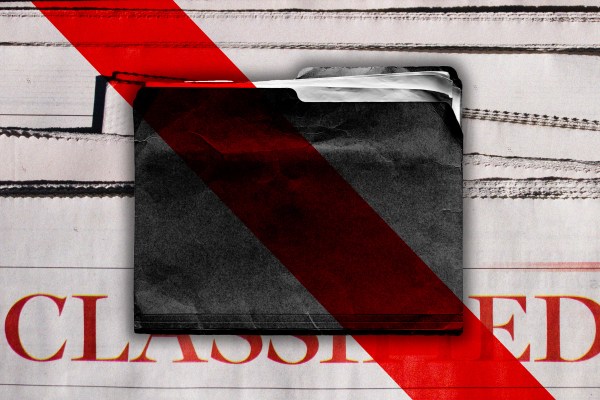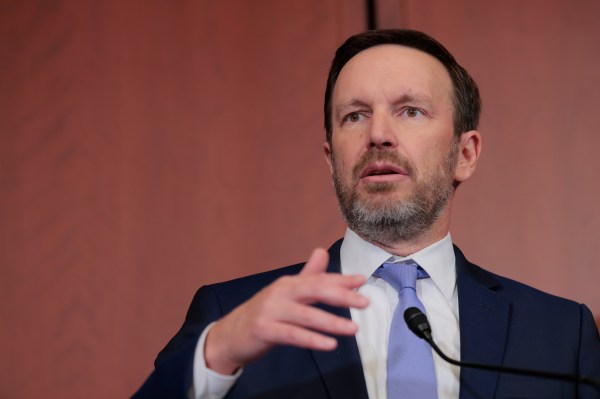The gap between coronavirus vaccination rates in red and blue states is real. Eighteen of the 20 worst-performing states on vaccinations voted Republican for president last year. By the same numbers, all 20 of the best-performing vaccination states voted Democratic. But does partisanship explain why there is a gap?
Certainly, there are some prominent Republicans and right-wing media figures discouraging vaccinations, even as struggling states see deadly outbreaks. Obviously, it would help if individuals respected in the places where the effort is stalling were supportive. But is skepticism about vaccines a product of Republicanism? Some influential people think so.
Here’s Chris Cillizza, an editor at CNN: “In theory, there is absolutely no reason why states that voted heavily for Trump should be any less willing to take a vaccine to fight a virus that has killed more than 600,000 Americans than states that went strongly for Biden.”
Holy crokano! Cillizza, who has spent decades covering politics and demography, surely knows better than to say there’s “absolutely no reason” for the disparity. The groups doing the worst at vaccinations include black Americans, Hispanic Americans, and poor white Americans. You can find a lot of folks who match those descriptions in the South, Southwest, and Appalachia, regions home to many red states. Cillizza says the problem is “the Trump/freedom train” rejection of vaccines. Here’s the finding from the Kaiser Family Foundation: “In California, 29% of vaccinations have gone to Hispanic people, while they account for 63% of cases, 48% of deaths, and 40% of the total population in the state. Similarly, in the District of Columbia, black people have received 43% of vaccinations, while they make up 56% of cases, 71% of deaths, and 46% of the total population.” Is MAGA to blame in Barrio Logan and Anacostia?
Or here’s the Washington Post’s Max Boot making a similar charge: “The states that have the lowest vaccination rates—Mississippi, Alabama, Arkansas, Louisiana, Wyoming—are all Republican redoubts,” he writes. “These Republicans have fallen victim to a virulent strain of misinformation circulating in the right-wing echo chamber.” While he may have a point with Wyoming, a state with middling income and education rates, all the other states he listed are among the poorest and least-educated. Mississippi ranks 49th for both median household income and percentage of the adult population with college degrees. Alabama, Arkansas, and Louisiana all have similarly rough numbers for income and education. All four are Southern states with large populations of very poor black and white residents with low educational attainment. They struggle with a host of health issues, so why should this one be any different?
It would be fair to say that lower-income whites without college degrees are more strongly inclined to both support Donald Trump and resist vaccinations, but the former is not the main cause of the latter. Poorer, less-educated voters have always been more susceptible to demagogic populism, but that’s not the cause of health struggles among those voters. Eighteen of the 20 worst states for obesity voted for Trump last year, too. They liked biscuits and gravy in West Virginia when they were still voting 60 percent Democratic. Say it with me, people: Correlation is not causation.
That’s not to say that the anti-vaccine voices on the right aren’t making things worse, but as is usually the case, politicians and media figures are lagging, not leading, indicators. It helps to think of these folks as chasing voters, viewers, money, and clicks. If Fox News’ viewership were as pro-vaccine as CNN’s, they’d probably be doing arm jabs along with the cooking segments on Fox & Friends. If college-educated voters in Maryland were as anti-vaccine as working-class voters in Tennessee, they’d be threatening to shut down the state health department in Annapolis, too.
As much as Cillizza, Boot, and many others would like to make the vaccine lag the fault of Republicans, the reality is that in chasing the support of anti-vaccine voters—or even standing silent on the subject—many in the GOP are digging a deeper electoral hole.
The comprehensive post-election study by the Pew Research Center on the 2020 presidential results had bad news for the proponents of base vs. base elections on both sides. Democrats should squirm at the idea that Trump improved his performance with Hispanic voters compared to 2016, including evidence of a college vs. non-college gap similar to the one among white voters. But the news is worse for Republicans who believe that their path back to majority relies on turning up the base volume.
Trump did better with rural voters than perhaps any Republican of the modern era. He increased his share with this sector, one heavy with working-class and non-college white voters, from an already commanding 59 percent in 2016 all the way to 65 percent. That is almost as impressive as President Biden’s eight-point improvement over Hillary Clinton’s 2016 showing in the suburbs, rising from 45 percent to 53 percent. But for one thing: There are twice as many suburban voters as there are rural voters. Trump could have gotten 100 percent of the rural vote and still would not have completely offset Biden’s advantage in the suburbs.
Republicans’ 2022 plan is to emphasize rising violent crime rates and excessive Democratic wokeism, e.g. critical race theory, to push suburbanites toward the Red Team. There’s evidence that tagging Democrats with “defund the police” and other left-wing inanities helped Republicans pick up seats in the House last year. The strategy also pleases the majority of the House members, many of whom represent rural areas where a narrative about urban crime and reverse racism will work, too. But the increase in pandering, anti-vaccine buffoonery on the right may interfere with the plan.
Amid coronavirus outbreaks caused by vaccine refusal, businesses and government institutions will apply increasing pressure on Americans to get their shots. Vaccination cards are likely to be part of American life for a while. Republicans will want to cater to their rural, working-class base by opposing these efforts. But guess which voters will be most inclined to get vaccinated and favor a world with more shots and fewer masks? Affluent, college-educated suburbanites. Democrats seem to be waking up to some of the dangers of sucking up to their urban base on crime and race. So far, evidence that Republicans understand the liabilities of vaccine opposition is less forthcoming.
Chris Stirewalt is a contributing editor for The Dispatch.







Please note that we at The Dispatch hold ourselves, our work, and our commenters to a higher standard than other places on the internet. We welcome comments that foster genuine debate or discussion—including comments critical of us or our work—but responses that include ad hominem attacks on fellow Dispatch members or are intended to stoke fear and anger may be moderated.
With your membership, you only have the ability to comment on The Morning Dispatch articles. Consider upgrading to join the conversation everywhere.